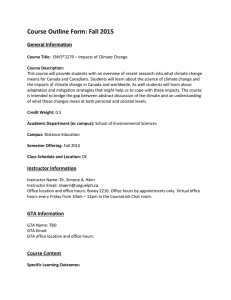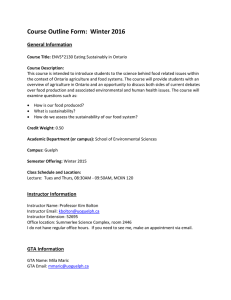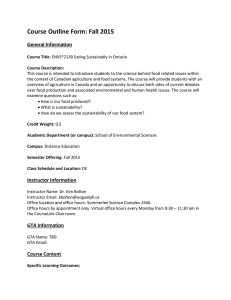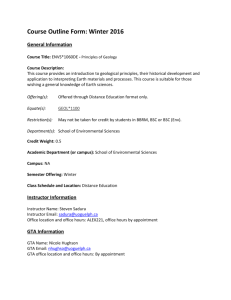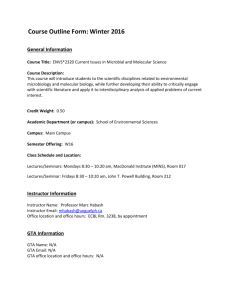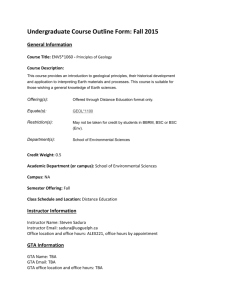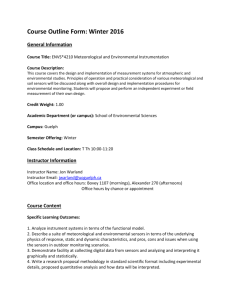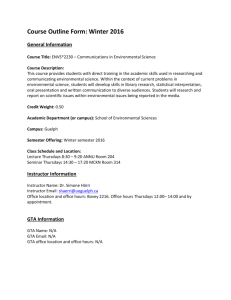Course Title: ENVS*2270 Impacts of Climate Change
advertisement
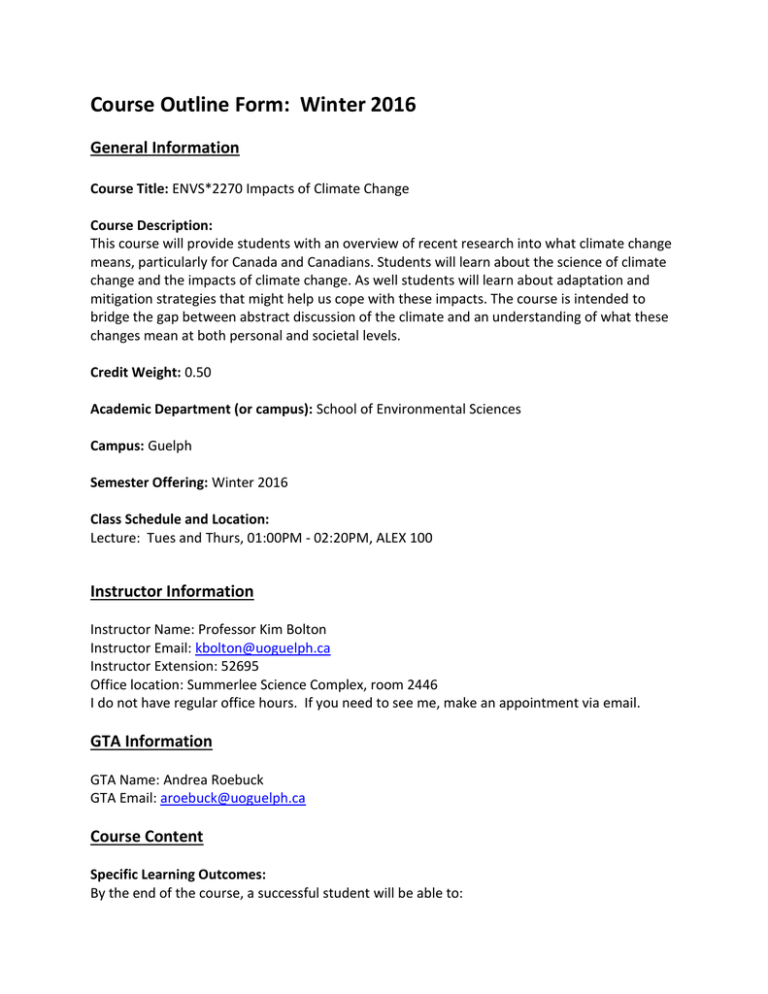
Course Outline Form: Winter 2016 General Information Course Title: ENVS*2270 Impacts of Climate Change Course Description: This course will provide students with an overview of recent research into what climate change means, particularly for Canada and Canadians. Students will learn about the science of climate change and the impacts of climate change. As well students will learn about adaptation and mitigation strategies that might help us cope with these impacts. The course is intended to bridge the gap between abstract discussion of the climate and an understanding of what these changes mean at both personal and societal levels. Credit Weight: 0.50 Academic Department (or campus): School of Environmental Sciences Campus: Guelph Semester Offering: Winter 2016 Class Schedule and Location: Lecture: Tues and Thurs, 01:00PM - 02:20PM, ALEX 100 Instructor Information Instructor Name: Professor Kim Bolton Instructor Email: kbolton@uoguelph.ca Instructor Extension: 52695 Office location: Summerlee Science Complex, room 2446 I do not have regular office hours. If you need to see me, make an appointment via email. GTA Information GTA Name: Andrea Roebuck GTA Email: aroebuck@uoguelph.ca Course Content Specific Learning Outcomes: By the end of the course, a successful student will be able to: 1. explain how interactions among atmosphere, ocean, land, and life lead to climate changes 2. describe the direct observations of climate change in recent decades, and articulate the evidence attributing global warming in this time period to human causes 3. evaluate their own contribution to greenhouse gas emissions and climate change 4. assess the utility - and limits - of climate models to predict global and regional climate change 5. analyze the assumptions and evaluate the worth of the evidence regarding impacts of climate change in Canada 6. engage critically and in a scholarly manner, in public arguments about climate change issues 7. evaluate the opportunities for climate change adaptation globally and in Canada 8. discuss proposed climate change mitigation strategies In the process we will address several of the University Learning Outcomes: ULO1 - Critical and Creative Thinking; ULO2 – Literacy; ULO3 - Global Understanding; and ULO4 - Communicating. Lecture Content: Weather and Climate o Atmospheric circulation and ocean currents o Earth’s energy budget o Radiative forcing o The Carbon cycle Let’s talk about Science o Scientists and the peer review process o IPCC o The importance of isotopes o Understanding graphs Evidence of Climate Change o Global temperature o Human fingerprints o Paleoclimate and climate proxies o Orbital cycles o Climate feedback Climate Projections o Emission scenarios o The climate models o The predictions Impacts of Climate Change on Oceans o Ocean warming and acidification o Sea-level rise Impacts of Climate Change o IPCC Terminology o Impacts on natural ecosystems o Impacts on Humans o What’s in store for Canada Adaptation and Mitigation o What can be done? o Climate Change adaptation o Mitigation strategies Labs: There are no labs in this course. Seminars: There are no seminars in this course. Course Assignments and Tests: Assignment or Test Due Date Mon Feb 8, 2016 Contribution to Final Mark (%) 10% Learning Outcomes Assessed 3 and 6 UL01, 02, 03 Calculate your Personal Carbon Footprint In-class Midterm Examination Impacts of Climate Change Report Tues Mar 1, 2016 20% Mon Mar 28, 2016 30% 1, 2, 4 and 5 UL01, 02, 03, 04 4, 5, 6 and 7 UL01, 02, 03, 04 Additional Notes: Midterm and Final Exams. Both exams are comprehensive, meaning that anything covered up to the midterm exam (including readings) is fair game, and the final exam will cover the entire course. Assignments: There are two written assignments in the course: Calculate Your Personal Carbon Footprint and Impacts of Climate Change Report. I will provide you with details about these assignments in class and on Courselink. Assignments should be submitted electronically via Dropbox on Courselink before midnight on the day that they are due. Final examination date and time: Wednesday April 13, 2016, 7:00 to 9:00 PM Final exam weighting: 40% Course Resources Required Texts: Dire Predictions (2nd edition) by Michael E. Mann and Lee R. Kump, DK Publishing Also available on library reserve. Recommended Texts: None Lab Manual: None Other Resources: Other on-line readings may be assigned throughout the course. Field Trips: None Additional Costs: No additional costs Course Policies Grading Policies: All assignments should be submitted via Dropbox on Courselink on or before the stated due date. Late assignments will receive a 10% deduction for each day that they are late. See Dr. Bolton if you wish to request an extension. Copies of out-of-class assignments: Keep paper and/or other reliable electronic back-up copies of all out-of-class assignments: you may be asked to resubmit work at any time. Course Policy on Group Work: You are not authorized to work together on any part of this course. Doing so would constitute academic misconduct. Course Policy regarding use of electronic devices and recording of lectures: Electronic recording of classes is expressly forbidden without consent of the instructor. When recordings are permitted they are solely for the use of the authorized student and may not be reproduced, or transmitted to others, without the express written consent of the instructor. University Policies Academic Consideration: The University of Guelph is committed to supporting students in their learning experiences and responding to their individual needs and is aware that a variety of situations or events beyond the student's control may affect academic performance. Support is provided to accommodate academic needs in the face of personal difficulties or unforeseen events in the form of Academic Consideration. Information on regulations and procedures for Academic Consideration, Appeals and Petitions, including categories, grounds, timelines and appeals can be found in Section VIII (Undergraduate Degree Regulations and Procedures) of the Undergraduate Calendar. Academic Misconduct: The University of Guelph is committed to upholding the highest standards of academic integrity and it is the responsibility of all members of the University community, faculty, staff, and students to be aware of what constitutes academic misconduct and to do as much as possible to prevent academic offences from occurring. University of Guelph students have the responsibility of abiding by the University's policy on academic misconduct regardless of their location of study; faculty, staff and students have the responsibility of supporting an environment that discourages misconduct. Students need to remain aware that instructors have access to and the right to use electronic and other means of detection. Please note: Whether or not a student intended to commit academic misconduct is not relevant for a finding of guilt. Hurried or careless submission of assignments does not excuse students from responsibility for verifying the academic integrity of their work before submitting it. Students who are in any doubt as to whether an action on their part could be construed as an academic offence should consult with a faculty member or faculty advisor. Detailed information regarding the Academic Misconduct policy is available in Section VIII (Undergraduate Degree Regulations and Procedures) of the Undergraduate Calendar. Accessibility: The University of Guelph is committed to creating a barrier-free environment. Providing services for students is a shared responsibility among students, faculty and administrators. This relationship is based on respect of individual rights, the dignity of the individual and the University community's shared commitment to an open and supportive learning environment. Students requiring service or accommodation, whether due to an identified, ongoing disability or a short-term disability should contact the Student Accessibility Services (SAS), formerly Centre for Students with Disabilities (CSD), as soon as possible. For more information, contact SAS at 519-824-4120 ext. 56208 or email sas@uoguelph.ca or visit the Student Accessibility Services website (http://www.uoguelph.ca/csd/). Course Evaluation Information: End of semester course and instructor evaluations provide students the opportunity to have their comments and opinions used as an important component in the Faculty Tenure and Promotion process, and as valuable feedback to help instructors enhance the quality of their teaching effectiveness and course delivery. While many course evaluations are conducted in class others are now conducted online. Please refer to the Course and Instructor Evaluation Website for more information. Drop period: The drop period for single semester courses starts at the beginning of the add period and extends to the Fortieth (40th) class day of the current semester (the last date to drop a single semester courses without academic penalty) which is listed in Section III (Schedule of Dates) of the Undergraduate Calendar. The drop period for two semester courses starts at the beginning of the add period in the first semester and extends to the last day of the add period in the second semester. Information about Dropping Courses can be found in Section VIII (Undergraduate Degree Regulations and Procedures) of the Undergraduate Calendar. Additional Course Information None
